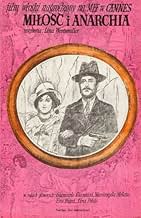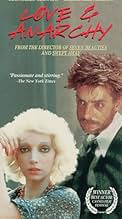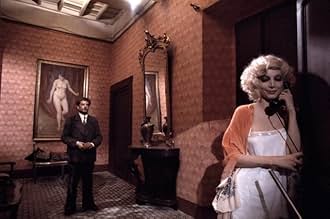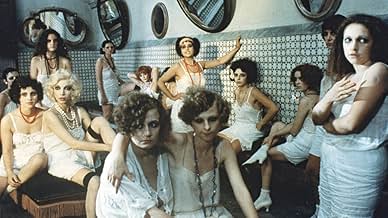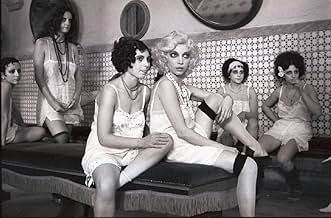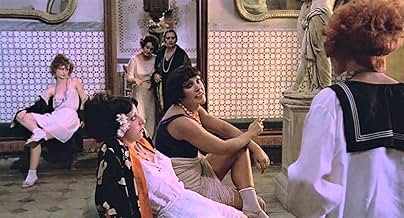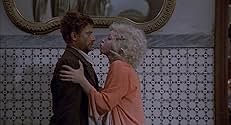Liebe und Anarchie
Originaltitel: Film d'amore e d'anarchia, ovvero 'stamattina alle 10 in via dei Fiori nella nota casa di tolleranza...'
IMDb-BEWERTUNG
7,7/10
3732
IHRE BEWERTUNG
Als ein Freund von den Faschisten ermordet wird, lässt sich ein melancholischer Bauer in einem römischen Bordell nieder, während er und eine anarchistische Prostituierte ein Attentat auf Mus... Alles lesenAls ein Freund von den Faschisten ermordet wird, lässt sich ein melancholischer Bauer in einem römischen Bordell nieder, während er und eine anarchistische Prostituierte ein Attentat auf Mussolini planen.Als ein Freund von den Faschisten ermordet wird, lässt sich ein melancholischer Bauer in einem römischen Bordell nieder, während er und eine anarchistische Prostituierte ein Attentat auf Mussolini planen.
- Regie
- Drehbuch
- Hauptbesetzung
- Auszeichnungen
- 4 Gewinne & 3 Nominierungen insgesamt
Empfohlene Bewertungen
10PWNYCNY
Excellent movie. Fast-paced, witty, earthy, entertaining dialog that tells a compelling story. That coupled with excellent acting, great continuity, and an unconventional setting makes this movie a special entertainment event. The movie also dramatizes the life of those on the margins of society and takes the audience on an emotional ride, generously spiced with conflict, arguments, squabbles, reconciliations and above all comradeship and friendship as the story takes a group of otherwise unsavory characters and elevates them to the level of real, but unsung, heroes who, hiding behind their masks of moodiness and bravado, have consciousness and really do care and are willing to act on it. Can a foulmouthed prostitute and a half-deranged peasant be heroes? Is a brothel a legitimate setting for hatching political conspiracies? Are those who society usually despises capable of heroism? This movie is about love and heroism and shows that even the most downtrodden are capable of great acts of personal selflessness. Great movie.
Rather than contend for film with the longest title, "Film of Love and Anarchy (or At Ten o'clock This Morning in Via dei Fiori in the Infamous House of Prostitution)" is better known by the more manageable "Love and Anarchy". This 1973 Lina Wertmüller thriller is a hard first watch because there is no suspense to grab the viewer and hook them into the story. I was only able to handle about 30 minutes at a time, not because it was unpleasant but because I was too uninvolved in the story to ignore distractions and interruptions. But while it withholds most of its appeal from the initial viewing, it yields something new each time it is viewed.
"Love and Anarchy" is more an expressionistic opera than a realistic thriller. Imagine "Cabaret" starring Charlie Chaplin's "Little Tramp" and you will have a good idea of its style.
It's main theme sneaks up and surprises you. U.S. viewers, dimly aware of the great depression and World War Two, suffer a complete cultural disconnect regarding the continuing legacy of fascism in Italy and Germany. Meaning that anti-fascist political messages are embedded in almost all post-war Italian cinema. But Wertmüller's "Love and Anarchy" has the broader theme of anti-extremism, taking shots at those who make major sacrifices out of perverted idealism and a lack historical perspective.
The film begins with its main character Tonino (Giancarlo Giannini) at a turning point in his life, the execution of an older relative for political subversion. After viewing the body on display in what would otherwise by an idyllic rural setting, Torino is inspired to take over what he perceives as his relative's mission, the assassination of Benito Mussolini.
Tonino goes to Rome and links up with his anarchist contact, a highly sought after call girl named Salomè (another Wertmuller regular Mariangela Melato), her brothel is popular with the Fascists and Mussolini's head of security, an arrogant blow-hard named Spatoletti (Eros Pagni), is especially fond of Salomè.
Tonino and young call girl Tripolina (Lina Polito) soon fall in love which serves to greatly complicate his mission.
I watched the widescreen version of the film on the Fox Lorber DVD, and contrary to several other comments I found no problems with the film transfer. My guess is that these refer to the variation in color tone as the film cuts between characters, but this is a deliberate effect by Wertmüller's. She lights each face differently to convey the character's motivation. The uncomplicated Torino is given natural lighting, the political Salomè is tinted red, and the disillusioned Tripolina is in shadow. These combine with bold colors, a surreal score, and acute camera angles that exaggerate elements and play with scale in many of the frames. The everyday scenes in the brothel are especially good, combining the audacious with the darkly comic. The best is a carnival-like montage to music showcasing the start of a busy day of business for the prostitutes and their eager customers.
In almost any other film Pagni would steal the whole thing with his overplayed performance but Melato matches him line for line. This contrasts nicely with the more subtle and nuanced performances of Giannini and Polito. Polito is very effective when Wertmüller makes use of her eyes in several close-ups.
There is much overwrought melodrama as Wertmüller uses a farcical tone to illustrate that the Fascists and their opposition are linked by a common hypocrisy and a shared perversion of idealism. Ironically the film is at its best during its quiet scenes such as Tornio and Tripolina's stroll through the plazas of the city.
This is an important film with an original message, fine performances from the entire ensemble, and really slick film-making techniques.
Then again, what do I know? I'm only a child.
"Love and Anarchy" is more an expressionistic opera than a realistic thriller. Imagine "Cabaret" starring Charlie Chaplin's "Little Tramp" and you will have a good idea of its style.
It's main theme sneaks up and surprises you. U.S. viewers, dimly aware of the great depression and World War Two, suffer a complete cultural disconnect regarding the continuing legacy of fascism in Italy and Germany. Meaning that anti-fascist political messages are embedded in almost all post-war Italian cinema. But Wertmüller's "Love and Anarchy" has the broader theme of anti-extremism, taking shots at those who make major sacrifices out of perverted idealism and a lack historical perspective.
The film begins with its main character Tonino (Giancarlo Giannini) at a turning point in his life, the execution of an older relative for political subversion. After viewing the body on display in what would otherwise by an idyllic rural setting, Torino is inspired to take over what he perceives as his relative's mission, the assassination of Benito Mussolini.
Tonino goes to Rome and links up with his anarchist contact, a highly sought after call girl named Salomè (another Wertmuller regular Mariangela Melato), her brothel is popular with the Fascists and Mussolini's head of security, an arrogant blow-hard named Spatoletti (Eros Pagni), is especially fond of Salomè.
Tonino and young call girl Tripolina (Lina Polito) soon fall in love which serves to greatly complicate his mission.
I watched the widescreen version of the film on the Fox Lorber DVD, and contrary to several other comments I found no problems with the film transfer. My guess is that these refer to the variation in color tone as the film cuts between characters, but this is a deliberate effect by Wertmüller's. She lights each face differently to convey the character's motivation. The uncomplicated Torino is given natural lighting, the political Salomè is tinted red, and the disillusioned Tripolina is in shadow. These combine with bold colors, a surreal score, and acute camera angles that exaggerate elements and play with scale in many of the frames. The everyday scenes in the brothel are especially good, combining the audacious with the darkly comic. The best is a carnival-like montage to music showcasing the start of a busy day of business for the prostitutes and their eager customers.
In almost any other film Pagni would steal the whole thing with his overplayed performance but Melato matches him line for line. This contrasts nicely with the more subtle and nuanced performances of Giannini and Polito. Polito is very effective when Wertmüller makes use of her eyes in several close-ups.
There is much overwrought melodrama as Wertmüller uses a farcical tone to illustrate that the Fascists and their opposition are linked by a common hypocrisy and a shared perversion of idealism. Ironically the film is at its best during its quiet scenes such as Tornio and Tripolina's stroll through the plazas of the city.
This is an important film with an original message, fine performances from the entire ensemble, and really slick film-making techniques.
Then again, what do I know? I'm only a child.
It's the second Wertmüller movie i watched. I liked a lot SWEPT AWAY. And this is even better.
It's hard to describe it in a foreign language since i am a non-native English speaker. It's multilayered, deep and there are a lot to uncover and a lot to make you contemplate. On the surface, there is a naive, simple country young man who gets entangled in pretty unknown situations to him, from women to Resistance and Rebels. You might even say this is a comedy for the most part.
But as the movie progresses, especially during the ending, it sets a lot of questions. Things are not exactly what they seem. Should we sacrifice ourselves for a higher purpose? Or it's delusional and vain? What is a hero? Are they being manipulated? Or it's better in any case to "die like a dog than to live like one?"
This is an anti-fascist movie and that is not something negotiabe in every logical human being. But as i said, it's not a simple and superficial movie. It makes you think.
It's a 2 hours movie and it doesn't drag for a second. At times, it's hilarious. Pace is great, acting is great, ending is powerful. A very good political comedy/drama/romance movie.
It's hard to describe it in a foreign language since i am a non-native English speaker. It's multilayered, deep and there are a lot to uncover and a lot to make you contemplate. On the surface, there is a naive, simple country young man who gets entangled in pretty unknown situations to him, from women to Resistance and Rebels. You might even say this is a comedy for the most part.
But as the movie progresses, especially during the ending, it sets a lot of questions. Things are not exactly what they seem. Should we sacrifice ourselves for a higher purpose? Or it's delusional and vain? What is a hero? Are they being manipulated? Or it's better in any case to "die like a dog than to live like one?"
This is an anti-fascist movie and that is not something negotiabe in every logical human being. But as i said, it's not a simple and superficial movie. It makes you think.
It's a 2 hours movie and it doesn't drag for a second. At times, it's hilarious. Pace is great, acting is great, ending is powerful. A very good political comedy/drama/romance movie.
Giannini at his best , a cult wertmuller movie that has been forgotten but it's a very good movie not only for Italian public but also for cinema lovers of all genres. it's the story of a poor man , Tunin which he must kill Mussolini during a ceremony. So he stayed for a couple of days in a house where there are women that offer sexual lends by paying. Tunin will fall in love with two of them and that will be negative for his mission. The excellent acting and the lina wertmuller's directing made this film a masterpiece and a realistic portrait of Italy of the '30. Giancarlo Giannini and Mariangela Melato are really wonderful and they show that Italian acting is at American level
I saw this movie in the 1980s but it remains an all time favourite. It is a terrific story with a range of characters who demonstrate extremes of character. The women are sexy and smart and they are critical to the story. The music by Nino Rota is wonderful and delicately placed within the story. There are many memorable scenes. The stars Giancarlo Giannini, Mariangela Melato, and Lina Polito are perfect for their roles and there are many other notables including Eros Pagni who is the brute given charge of the black shirts. I've watched this film at least a dozen times and I plan to watch it many more before I return to the earth. I commend Love and Anarchy to you.
Wusstest du schon
- WissenswertesErrico Malatesta, who is quoted at the end of the film, was an Italian anarchist propagandist and revolutionary socialist. He edited several radical newspapers and spent much of his life exiled and imprisoned, having been jailed and expelled from Italy, England, France, and Switzerland. After World War I, he returned to Italy where his Umanità Nova, an anarchist newspaper, had some popularity before its closure under the rise of Mussolini. Malatesta was a committed revolutionary. He believed that the anarchist revolution was inevitable and that violence would be a necessary part of it since the state rested ultimately on violent coercion.
- Crazy CreditsBefore end credits: "I wish to repeat my horror that attacks, which besides being bad in and of themselves are also stupid, because they harm the very cause they are trying to serve...But those assassins are also saints and heroes...And they will be celebrated once the brutal facts are forgotten, and all that is remembered is the idea that inspired them and the martyrdom that made them saints.--Errico Malatesta."
- Alternative VersionenFor the initial American release, editor Fima Noveck created a prologue which featured a montage of photos of Mussolini, along with a crawl explaining his rise to power and the violent activities sanctioned in his name during his reign.
- VerbindungenFeatured in Dietro gli occhiali bianchi (2015)
Top-Auswahl
Melde dich zum Bewerten an und greife auf die Watchlist für personalisierte Empfehlungen zu.
- How long is Love & Anarchy?Powered by Alexa
Details
- Erscheinungsdatum
- Herkunftsländer
- Sprache
- Auch bekannt als
- Liebe & Anarchie
- Drehorte
- Parrocchia Santissima Annunziata, Piazza Reg. Margherita, 6, 04016 Sabaudia LT, Italien(Tunin cases the outside of the church)
- Produktionsfirmen
- Weitere beteiligte Unternehmen bei IMDbPro anzeigen
Box Office
- Weltweiter Bruttoertrag
- 965 $
- Laufzeit2 Stunden 4 Minuten
- Sound-Mix
- Seitenverhältnis
- 1.85 : 1
Zu dieser Seite beitragen
Bearbeitung vorschlagen oder fehlenden Inhalt hinzufügen

Oberste Lücke
By what name was Liebe und Anarchie (1973) officially released in India in English?
Antwort

